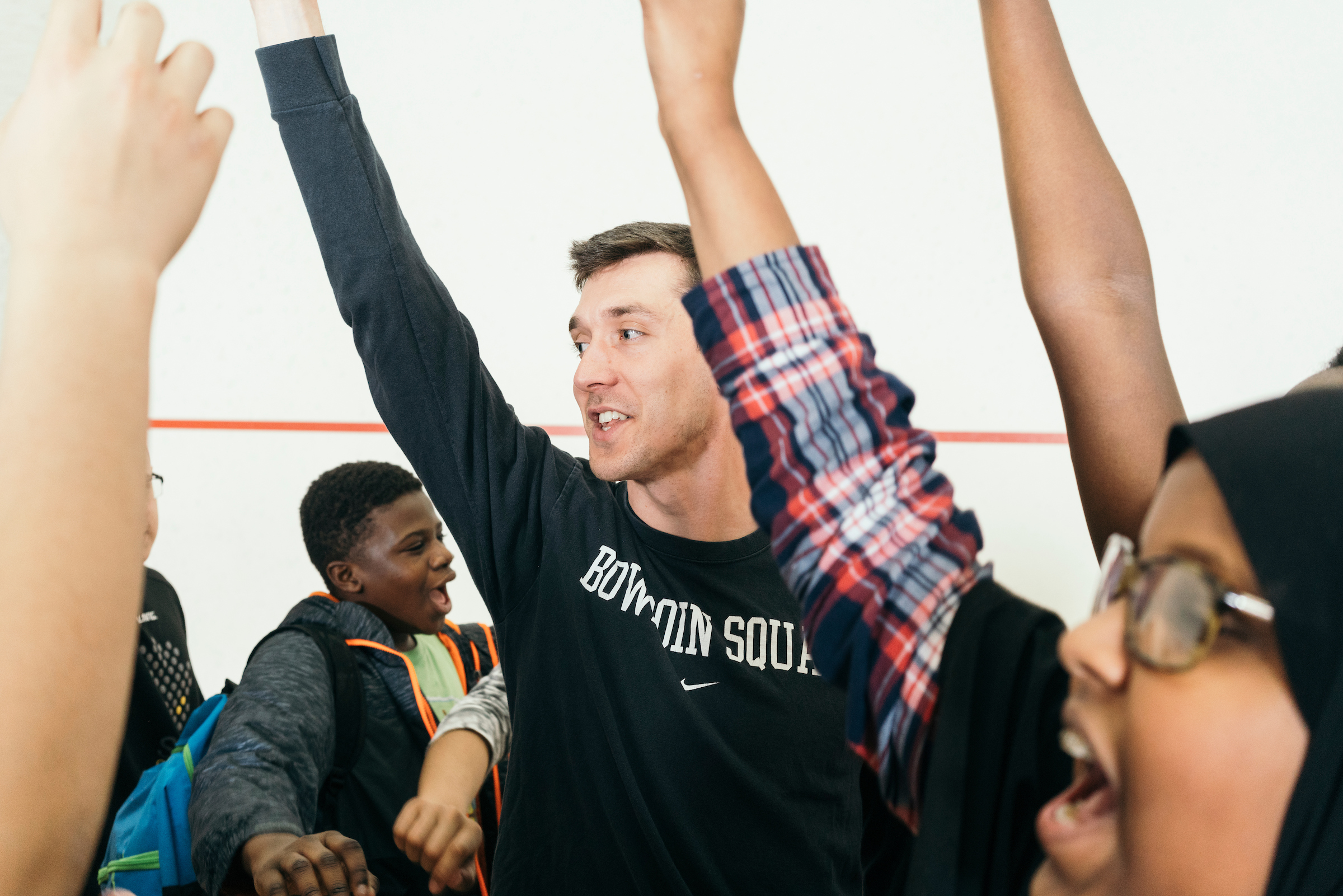Through squash, Takesian ’12 challenges social and economic segregation in Portland community
November 6, 2020
 Courtesy of Barrett Takesian
Courtesy of Barrett TakesianAfter graduating from Bowdoin in 2012, Barrett Takesian ’12 founded Portland Community Squash (PCS) an academic, social and athletic program committed to mentoring children and teenagers in the Portland area—opportunities that are typically hard to find.
“We have four different youth programs that support the whole student,” Takesian said in a Zoom interview with the Orient. “We support the squash player, but we also have wellness programs such as cooking classes, yoga and critical conversation skills.”
His goal when opening PCS in 2012 was to provide accessibility for all to the world of squash, which is commonly thought of and often is an elitist and wealthy sport. Takesian challenged himself to think about the trends of inequality and exclusion that extend far past the game of squash and the city of Portland and how he could contribute to eliminating those trends.
“This project inspired me to think beyond squash…I started with squash, but there’s nothing that says it [just] has to be squash,” Takesian said. “There is a lack of representative, equal communities in our cities, and I think that sports and arts-based organizations are such an easy way to create common ground…They’re great tools for bringing people together across socio-economic, religious and racial lines, and across zip codes as well.”
Takesian said the sense of support and community he found on Bowdoin’s campus and squash team led to a desire to instill the same sense of welcoming community among Portland’s youth.
“I moved around a lot as a kid, so I felt like I had really found a home for the first time at Bowdoin,” he said. “I felt like, wherever I went on campus, someone would know me or recognize me.”
Despite graduating eight years ago and having arrived at Bowdoin as a transfer student, Takesian still has fond and vivid memories of his experiences at Bowdoin, such as botching an important saxophone performance and receiving a note that thanked him for his kindness during his time as a proctor in Moore Hall.
“The note read, ‘Thank you for making me believe in the Bowdoin Hello.’ It was an anonymous shoutout, but I’ll never forget that one,” he said.
Outside of community building skills he learned at Bowdoin, he also credits the squash team and the College’s liberal arts curriculum for the success of PCS from its early days to the present.
The College’s squash team organized the fundraising efforts for PCS’ first few programs in 2012, and even today, Takesian channels his liberal arts mindset in the workplace.
“You have to do everything well. The communication has to be good, the curriculum has to be good and your organizational skills have to be on point,” he said. “Bowdoin made me well-rounded. I was a jack of all trades and a master of none.”
Upon graduating in 2012, Takesian had a vision. Although he was working for an insurance company at the time, he volunteered at community centers during his time off and never lost sight of his dream of combining squash with community outreach and inclusivity.
“I always remembered that [squash] was a passion, and I kept working on it and I fed it,” said Takesian. “Now I have a whole career in front of me, doing what I love.”
He encourages current Bowdoin students to approach their education and future goals with a similar mindset.
“Never give up on your side hustle,” he joked.
Looking toward the future, he has even greater aspirations for his organization and its level of community outreach.
“We’re actually planning a big expansion to build up the social component of our organization. We’re hoping to build the most inclusive social space in the city,” he said. “We’ll be having potlucks and music and gatherings four to five nights per week once it’s safe to do so.”
While other organizations have struggled during the coronavirus pandemic, Takesian, optimistic as usual, has found the silver lining. Without as many programs to oversee, he has used his newfound free time for reflection and planning.
“When we run into challenges, we just have to find the opportunities,” he said.
Takesian plans to continue tapping into the economic and cultural promise of Portland that prompted him to stay in Maine in the first place.
“Portland is changing so rapidly, and there are so many opportunities,” he said. “It needs young people to shape it, so we get to decide how we want to grow and change as a state.”
Through his determination and passion, he hopes to create change in monumental ways.
“I can see a day within the next 10 years where every student in the Portland school system has access to opportunities outside of school,” Takesian said. “The system is small enough where we can have that impact.”

Comments
Before submitting a comment, please review our comment policy. Some key points from the policy: